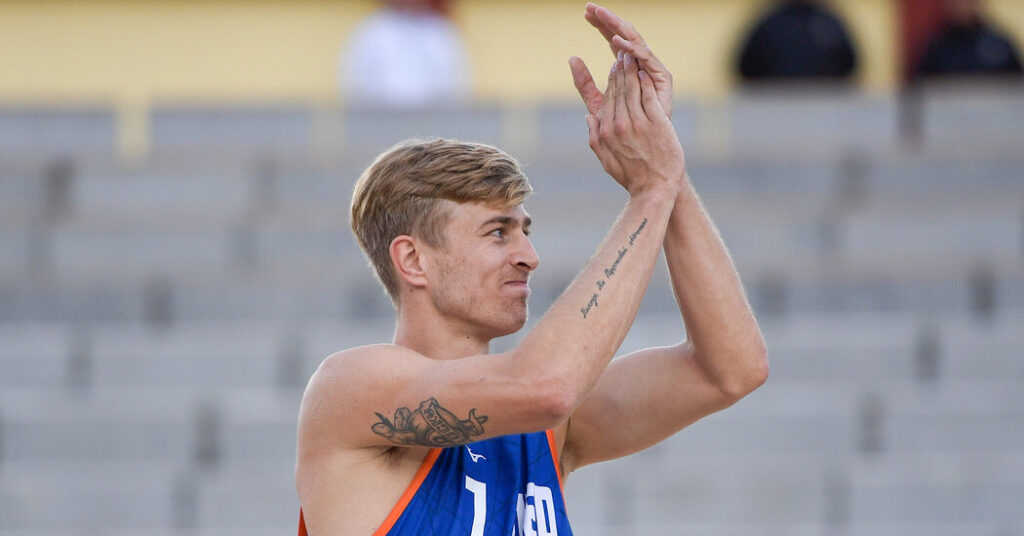The Dutch Volleyball Association and the Dutch Olympic Organizing Committee are backing the decision to send a man convicted of rape to represent the Netherlands in beach volleyball at this summer's Paris Olympics.
In 2014, a man named Steven van de Velde, now 29, traveled to the UK and raped a 12-year-old girl he met on Facebook. In 2016, a UK court sentenced him to four years in prison. A year later, he was extradited to the Netherlands, where his sentence was adjusted under Dutch law. Van de Velde spent just over a year in prison in total.
The volleyball association said he has since received professional counselling.
The Dutch Olympic Committee and the Dutch Volleyball Association said on their websites that they had allowed van de Velde to compete based on the advice of experts who determined that the risk of reoffending was very low. Van de Velde resumed her beach volleyball career in 2017.
Although the international media reported his participation in the Olympics with outrage, the story did not receive much attention in the Netherlands, where the Dutch press mainly reported on the international media and how they covered the incident.
“Especially overseas, there was reason to rekindle the 29-year-old beach volleyball player's past,” the volleyball association said in a statement on its website.
Sarah Alaoui, founder and president of the Safe Space Club, a nonprofit that supports victims of sexual abuse, said she was surprised the case hadn't received as much attention as other less important sports news (Dutch news media, for example, reported that soccer player Memphis Depay had been seen wearing a headband during a recent match).
Van de Velde admitted to the crime and told Dutch media it was the worst mistake of his life.
“This is a big mistake and nobody can deny it. There is nothing we can do about it now,” van de Velde told Dutch broadcaster NOS in an interview in 2018. “We have to live with the consequences because we can't undo it.”
Alaoui said she was disappointed by Van de Velde's lack of remorse and introspection, which she said sends the message that “if you're a white Adonis, you're less responsible.”
“If you are truly remorseful and this is the biggest mistake of your life, you have to show why you deserve a second chance,” she said. One way would have been to work with organizations that fight sexual abuse, she said.
“I don't understand this kind of reaction in the Netherlands after the MeToo movement,” she said. “We are talking about child abuse here.”
Olympic organizers were aware of van de Velde's background and said in a statement they had had extensive discussions with him.
“When van de Velde looks in the mirror now he sees a mature, happy man, married and father to a beautiful son,” the Dutch Volleyball Association (Nebobo in Dutch) said on its website.
“He has proven himself to be an exemplary professional and person and we have no reason to doubt him since his return,” volleyball association secretary-general Michelle Everaert said in a statement.
Van de Velde is not the first Olympian to be convicted of a crime. The most notorious was Tonya Harding, who competed on the U.S. figure skating team at the 1994 Winter Olympics and was allegedly involved in an assault on rival Nancy Kerrigan. Harding was allowed to compete on Kerrigan's team and finished eighth. Harding later pleaded guilty to hindering prosecution and was sentenced to a fine, probation and community service.
Bruce Kimball was a silver medalist in diving in 1984 and hoped to return to the U.S. Olympic team in 1988. Two weeks before the Olympic Trials, he crashed into a group of teenagers while driving while drunk, killing two. Mothers Against Drunk Driving and friends of the victims opposed his inclusion in the trials, but he was allowed to compete. He finished fourth and sixth in both events, missed out on the team, and ultimately served a four-year prison sentence.
Victor Mather Contributed Reports

